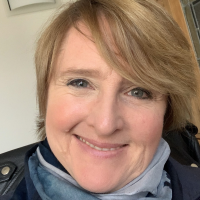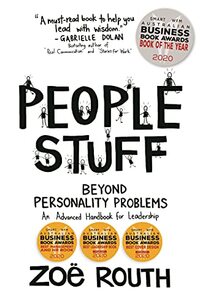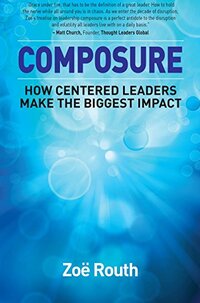Zoe Routh Interview Published on: 02, May 2024
 Can you tell us a bit about your background and what inspired you to become a writer?
Can you tell us a bit about your background and what inspired you to become a writer?
I started storytelling as a kid. I remember putting on a play for the neighbourhood parents with the other kids around the block. They humoured us and I remember enjoying their enthusiasm. I also loved reading and always had my head in a book. I would read anywhere: on the stairs waiting for my family to get ready to go out, on the floor of the car while we drove(before seatbelts were mandatory), at night in bed. I just loved books! I studied English Literature at university but then decided I wanted to go and live a life instead of reading about other people having a life. It was ten years before I started writing again, this time for my work as a leadership expert. Fifteen years later and four nonfiction books on, I started writing fiction too.
Could you share a memorable moment from your leadership journey that significantly shaped your perspective or approach?When I worked at the Australian Rural Leadership Foundation, I learned about leadership maturity and how we develop and evolve perspectives as we move through life. It coincided with meeting a futurist - someone who studies trends and events and makes calculated predictions about what's important to respond to as a leader. My mind was blown by what he shared about the future. Those two ideas and approaches burst in my brain and I became obsessed about exploring perspectives and how we can see more to lead better.
How do you see the themes in your dystopian novel reflecting current trends and challenges in leadership and society?The background of my novels and nonfiction addresses the growing challenges of a complex and volatile world with multiple interdependent international systems, including the impact of climate change and political influences. I'm fascinated by how these trends will shape our horizons and how we need to lead differently in order to contend with our evolving future.
How do your experiences as an outdoor adventurist and athlete influence your approach to leadership and writing?Adventure is one of my core values. It has shaped my interests and my passions as an individual and as a professional. I have seen powerful changes in people in the crucible of wilderness experiences: inspired by the majesty of the natural world, challenged by the adversity of mother nature, compelled to rely on one another in difficult times. We cannot be separate from our natural world and in all of my work, the environment plays a central role in shaping the destinies of characters.
What inspired you to transition from leadership consultancy and writing non-fiction books to venturing into near-future science fiction with "The Olympus Project"?While I was writing my last nonfiction book, People Stuff, I was reading Ursula K Le Guin's remarkable Earthsea series. Her language was so compelling and beautiful and captured much of what I believed about the connection between humans and care and wonder of the natural world. I asked myself, 'could fiction be a more powerful way to reach people and spark interest and curiosity in my leadership ideas?' I wasn't interested in fables or parables as I find those way too didactic and prosaic, and thrilled at the challenge of crafting good prose to inspire others.
Can you share some key insights from your latest book, "The Olympus Project," and how they relate to your work as a leadership futurist?The book explores several questions I've been mulling over when it comes to leadership. What is needed to live and work together in difficult circumstances? Can we overcome our more primitive selves to work better together? Can we learn to evolve quickly in our environments? Can our built environment accelerate human development? How do we choose people for teams - skill or potential? Can we ever really atone for past wrongs? In the novel, I do the work of a futurist and forecast a world where climate change has dramatically changed the way we need to live together, causing the emergence of new industries along with the challenges. Central to the issues is the notion of how we can work together when people have different stages of leadership maturity and different perspectives on what is important. This is a perennial leadership conundrum.
What role do you believe storytelling plays in conveying leadership principles and futuristic concepts effectively?It's all about imagining possible futures and playing out hypotheses. Fiction helps us imagine tough times and we live vicariously through the characters, their trials and tribulations, and we learn their lessons without the visceral pain. It's the fastest and safest way to accumulate life experience and wisdom. Good fiction makes us really think about how we are feeling and thinking in response to what the characters are doing/saying/feeling. It challenges us to confront our own humanity - failings and strengths - and invites us to be better.
With your extensive experience working internationally, how do cultural differences impact leadership strategies, and how do you navigate them?Cultural norms and values are tricky things! Being curious is central to being a good international citizen. Rituals may seem weird or silly at the outset, but are often rooted deeply in common human values. There is no one right way to live as people and societies; by being open to differences as a source of richness, it helps us find common ground and mutual respect.
What advice would you give to leaders aiming to foster a culture of innovation and adaptability within their organizations?Three things to focus on include: Curiosity - always be asking why and how and what if. Compassion - we're in this together, so work on supporting one another. Connection - leadership is shared adventure, so the better connected we are with one another the better we can tease out new ideas, new insights, and opportunities.
In your podcast, you explore the future of leadership with "What if...?" questions. What are some of the most intriguing or thought-provoking questions you've explored so far?Here are some of the latest ones that are keeping me chewing on thought experiments: what if we had more fun at work? What if we listened and read people like spies do? What if we used AI as a leadership coach on a daily basis? What if the blockchain became our major way of regulating financial systems and business transactions leading to radical transparency? What if we could overcome polarised conversations to have more curious discussions?
How do you balance the need for composure and decisiveness in leadership, especially in high-pressure situations?Composure is essential for decisiveness otherwise it's impulsiveness. Maintaining composure consists of regular practice of biological control through practices like meditation, mindfulness, exercise, breathing techniques. It also includes deep self awareness including knowing one's purpose, values, and ethical filters to help make decisions under pressure.
Your book "Moments" focuses on leadership during critical times. Can you discuss the importance of these moments and how leaders can prepare for them?Moments builds on the concepts I wrote in my first book, Composure. There are three types of difficult moments: moments of truth or rock bottom, rock and a hard place or ethical defining moments, and heat of the moment, or interpersonal moments. The same concepts apply: rigorous practice of focus and physical discipline to manage our biochemical responses to stress in difficult times, filters for our ethical challenges, and deep-seated compassion that can help us reach for an expanded perspective when someone is pushing all our hot buttons.
As someone who has faced and overcome challenges, including surviving cancer, how has adversity shaped your leadership philosophy?My friend told me I was the toughest person she knew. I can walk for hours carrying a heavy pack up steep hills, I've run six marathons, I've braved the stage and bellydanced in front of strangers! I've done a lot of hard physical things and know what it's like to be cold, tired, hungry, and miserable. Having such a depth of challenging moments, it helps as a memory bank. I remind myself I've been in tough places before, I can get through this latest thing. Doing hard things is good for the soul! When COVID hit, it was a whole new challenge and I had no benchmark for it. But what I did have was tools: the ability to examine a problem, to confront the brutal facts, to make hard decisions. These are leadership skills. Adversity has helped shape my personal resilience, and my connection to others in shared adventures has helped shape my leadership philosophy of always looking after each other.
What's next for you in terms of writing projects or areas of exploration within the field of leadership?I'm working on a nonfiction book on leadership and power, as well as building some of those themes into the next Gaia book, Olympus Rising.
What are your thoughts on AllAuthor? Is this a website you see yourself using for some time, even in the future?AllAuthors is an incredible resource for Authors! I have loved the resources and approach. It makes the sometimes isolating aspects of writing and publishing easier and more fun. I'm definitely a fan!
Share Zoe Routh's interview
Zoë Routh is a seasoned leadership futurist, renowned podcaster, and accomplished author, celebrated for her expertise in guiding leaders and teams through the complexities of tomorrow. Her fourth book, "People Stuff," earned her the prestigious Book of the Year award at the Australian Business Book Awards in 2020. Beyond her insightful non-fiction work, Zoë ventures into the realm of near-future science fiction with her fifth book, "The Olympus Project."
 Olympus Rising (Dystopian science fiction corporate thriller series - Gaia Enterprises Book 3)
Genre: Science Fiction
Olympus Rising (Dystopian science fiction corporate thriller series - Gaia Enterprises Book 3)
Genre: Science Fiction
 Power Games: A Leader's Guide to Office Politics and Drama-Free Collaboration
Genre: Advice & How To, Business
Power Games: A Leader's Guide to Office Politics and Drama-Free Collaboration
Genre: Advice & How To, Business
 Olympus Bound: Gaia Book 2 (Dystopian science fiction corporate thriller series - Gaia Enterprises)
Genre: Science Fiction
Olympus Bound: Gaia Book 2 (Dystopian science fiction corporate thriller series - Gaia Enterprises)
Genre: Science Fiction
 The Olympus Project: Gaia Book 1 (Dystopian science fiction corporate thriller series - Gaia Enterprises)
Genre: Science Fiction
The Olympus Project: Gaia Book 1 (Dystopian science fiction corporate thriller series - Gaia Enterprises)
Genre: Science Fiction






